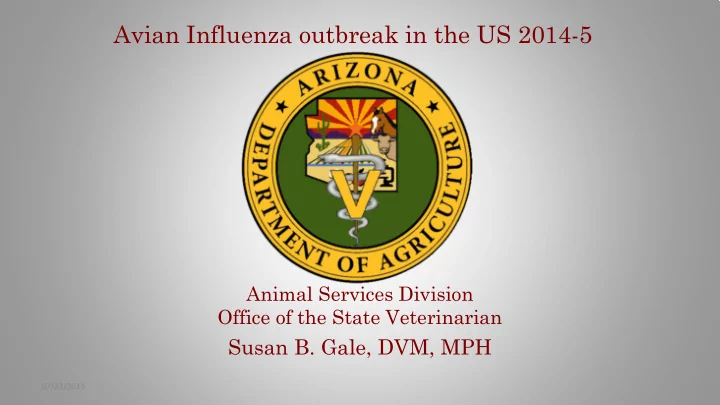

Avian Influenza outbreak in the US 2014-5 Animal Services Division Office of the State Veterinarian Susan B. Gale, DVM, MPH 07/22/2015
Objectives • Summary of recent outbreak • High Pathogenicity versus Low Pathogenicity • Disease control measures • Future outbreak expectations • Arizona poultry producer preparedness
Avian Influenza outbreak in the US 2014-5 “Today, we are facing the largest animal health emergency in this country’s history.” Dr. John Clifford, USDA Chief Veterinarian In testimony before the Senate Homeland Security and Governmental Affairs Committee Hearing on Stopping an Avian Influenza Threat to Animal and Public Health July 8, 2015
Summary of outbreak Courtesy of www.aphis.usda.gov
Healthy turkeys
Just 2 hours later
Severe mortality due to HPAI
West coast outbreak Avian Influenza detections, December 14, 2014 – February 24, 2015
Migratory waterfowl Northern Pintail Mallard Northern Shoveler Canada Goose American Wigeon
Migratory flyway map
West Coast outbreak H5N8 H5N2 H5N8 & H5N2 H5N8, H5N2 & H5N1
Reassortment Eurasian H5 HPAI with North American LPAI N2
Midwest outbreak Avian Influenza detections, December 14, 2014 – June 5, 2015
Response Measures • Reportable • Quarantine and movement controls • Depopulation and carcass disposal • Epidemiological investigation • Control zone testing • Cleaning and disinfection • Environmental testing • Fallow period • Restocking
Prevention Measures • Biosecurity – Keep the virus out of flock houses – Stop the virus from moving off the farm • Vaccination – Doesn’t prevent virus infection, birds are still contagious – Limited effectiveness in chickens, untested in turkeys – Ban on exports from entire USA, not just affected areas – More research needed
Expectations for fall • HPAI is expected to return with migratory waterfowl • Likely to infect more farms and spread to Atlantic Flyway • May have more subtypes • Wild waterfowl surveillance program for early detection
Arizona poultry preparedness • Migratory waterfowl surveillance program • Sentinel flock testing • National Poultry Improvement Program • Biosecurity audit of poultry farms • More restrictive poultry import rules • Outreach and education • Prepare plans for mass depopulation and disposal
Public Health Concerns • HPAI H5N8, H5N2 and North American H5N1 have not been transmitted to humans……yet • Properly cooking poultry meat and eggs inactivates HPAI • Safe disposal of infected poultry prevents introduction into food or water supply • Food supply shortages, increased price
Questions Thank you!
Recommend
More recommend